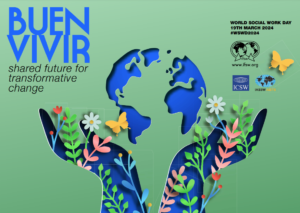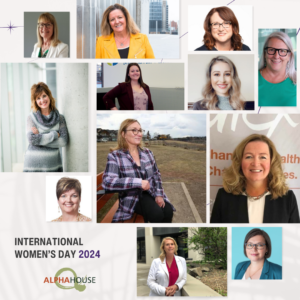Partnering with the Indigenous Drug Treatment Court
Shaundra Bruvall | March 19, 2024

Indigenous Drug Treatment Court Partnership:
Celebrating World Social Work Day 2024
World Social Work Day takes place on 19 March 2024. This year’s theme is ‘Buen Vivir: Shared Future for Transformative Change’, which emphasizes the need for social workers to adopt innovative, community-led approaches that are grounded in indigenous wisdom and harmonious coexistence with nature.[1]
Given the theme of this year’s World Social Work Day, we want to share about an innovative partnership Alpha House’s Detox Program has with the Calgary Drug Treatment Court’s Indigenous program. Drug Treatment Courts (DTCs) were established as a response to the drug epidemic in Canada, specifically focused on reducing recidivism regarding crimes linked directly or indirectly to substance use challenges. The first DTC in Canada was established in Toronto in 1998, followed by a second in Vancouver in 2001, and four more DTCs in 2005 covering Edmonton, Regina, Winnipeg, and Ottawa. The Calgary Drug Treatment Court (CDTC) started operations shortly after in 2007.[2]
The CDTC follows a diversion model aimed at court intervention and treatment services with the goal of ending drug-driven crime and assisting participants in returning to their families, workplaces, and communities by providing an alternative to incarceration.[3] The CDTC will consider individuals with charges related to substance dependencies where the expected jail time is between 1 and 5 years. Eligible charges include crimes like theft, breaking and entering, possession and intent to distribute, or other adjacent drug driven crime.[4] The CDTC accepts individuals from many different situations, and as a result, they’re running at full capacity most of the time.
CDTC provides weekly court intervention, addiction treatment, connection to resources, and a range of programming that addresses substance dependencies and community reintegration. The assistance that the CDTC provides doesn’t stop at direct addictions treatment, the CDTC will also assist with referrals (including long-term housing and medical), employment, and participation in recovery and aftercare programs.[5] Recovery looks different for each person, and success is greatly improved when individuals are given the agency to determine their own goals of treatment with the support of a care provider. The CDTC has a network of resources, partners, and supports that they can connect individuals with to help reach their goals – one of those partners is Alpha House!
The population of individuals Alpha House serves is roughly 55% Indigenous and we know that Canada’s drug overdose crisis disproportionately affects the Indigenous population.[6] A study on overdose data and the Indigenous population in BC shows that Indigenous peoples experience 14% of all overdose events while they only make up 3.4% of the population.[7] Further exacerbating this issue, culturally safe mental health and substance use treatment can be difficult to access for a variety of reasons. The CDTC’s Indigenous Program has similar aims of community integration and wellness but specifically looks to address the lack of supports created by a history of colonialism, racism, and intergenerational trauma faced by the Indigenous population in Canada.
The CDTC’s Indigenous program’s partnership with Alpha House sets aside 2 beds every week for Indigenous individuals who are wanting treatment. These clients either start in the Detox program or, if already sober, move into the Transitional Recovery program while we support them with referrals to long-term treatment programs or other social service supports (income assistance, employment referrals etc).
The CDTC partners with groups that can provide a safe place to go to support a treatment process; instead of getting released to the street, individuals in the program get released to a partner like Alpha House. Probation officers and parole officers will work hand in hand with Alpha House staff; setting up phone or in-person meetings to support the requirements of the CDTC while ensuring the individual is in a safe place with supports. The most common transition into the program is for individuals just getting out of remand; the Indigenous Judge assigned to the client’s case will meet with the CDTC lawyers who do the initial assessments of a person’s case and, ideally, support them towards a partner like Alpha.
“We are really pleased with the way the program has been operating; those 2 beds are full all the time. Often clients will move to long-term programs or they’ll work with us through their detox and move towards other options in line with their CDTC conditions.” – Diane Dumais, Program Director – Detox
The CDTC follows a 5-stage program that follows individuals from addiction treatment all the way to community reintegration and graduation. A detailed breakdown of the stages can be found here.[8]
Alpha House is a partner in Stages 1 and 2 of the CDTC’s program: the focus of Stage One is addiction treatment where participants either attend a residential addiction treatment program or a day program. The focus of Stage 2 is developing recovery skills. In this stage participants attend a minimum of 3 support groups per week that work best for their recovery and attend court on a weekly basis.
[1] https://www.ifsw.org/social-work-action/world-social-work-day/world-social-work-day-2024/#:~:text=World%20Social%20Work%20Day%20takes%20place%20on%2019%20March%202024.&text=As%20we%20approach%20%23WSWD2024%2C%20this,on%20mutual%20respect%20and%20sustainability
[2] https://calgarydrugtreatmentcourt.org/about-us/
[3] https://www.justice.gc.ca/eng/rp-pr/csj-sjc/jsp-sjp/rr06_7/rr06_7.pdf
[4] https://calgarydrugtreatmentcourt.org/applicants/
[5] https://calgarydrugtreatmentcourt.org/wp-content/uploads/2015/06/AlbertaDTCs-An-Essential-Part-of_-Albertas-Justice-Strategy.pdf
[6]https://www.fnha.ca/AboutSite/NewsAndEventsSite/NewsSite/Documents/FNHA_OverdoseDataAndFirstNationsInBC_PreliminaryFindings_FinalWeb_July2017.pdf
[7] https://www.ncbi.nlm.nih.gov/pmc/articles/PMC6291395/
[8] https://www.ccsa.ca/sites/default/files/2023-11/Drug%20Treatment-Courts-Review-and-Recommendations-en.pdf
